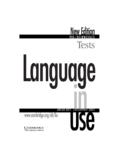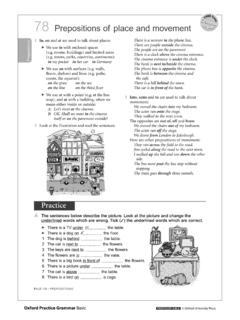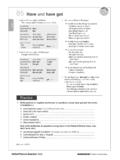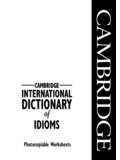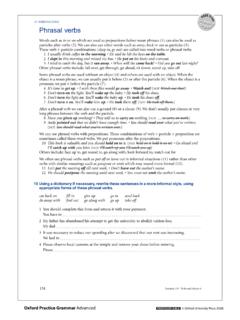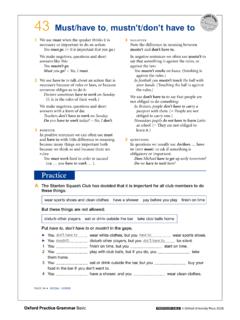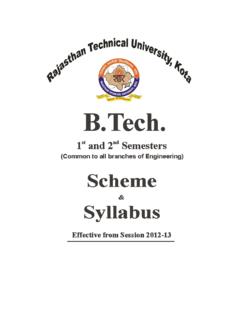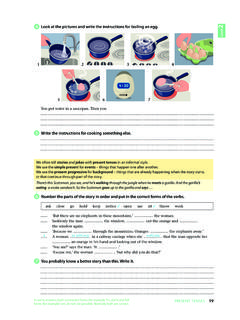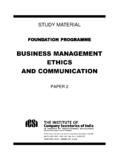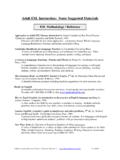Transcription of Grammar to go! Lesson Link - englishservice.cz
1 Lesson length: 45 minsAim: 1. to review the use of may, might, could, must and can t to express possibility and probability 2. to review the use of may, might and could when talking about possibility and probability in the future 3. to extend vocabulary for expressing probabilityPreparation: You will need a copy of the following for each student/pair of students: Activity worksheet: possibility and probability Activity worksheet: Oxford Word Skills Unit 59 - I can express probabilityGrammar Review: n Write the following phrases on the board: wears a wedding ring / be married don t know where Dad is / be in the garden sky looks cloudy / rain Anna s too far behind / win the race bought a lottery ticket / be a millionaire n Say aloud: She wears a wedding ring.
2 ~ She must be married. I don t know where Dad is. ~ He may be in the garden. The sky looks cloudy. ~ It might rain. Anna s too far behind. ~ She can t win the race. I ve bought a lottery ticket. ~ You could be a millionaire! n Ask students to repeat the phrases after you. Then say aloud the first part only and ask students to complete the phrases aloud as a class in response. Write the complete phrase with the modal verbs in place on the board. n Tell the class that these phrases are all about possibility and probability. For each phrase, ask whether the speaker feels sure about what they are saying, or whether they think what they are saying is possible, but they aren t sure.
3 N Draw this diagram on the board underneath the example sentences, but don t include the modal verbs. Tell students that the line represents how sure we are about something. Ask students to put may, might, could, must and can t in the correct place. - isn t can t be could be may/might be must be is +n Looking again at the example sentences, ask: Are these sentences about now or the future? [She must be married. - now He may/might be in the garden. - now It may/might rain. - future She can t win the race. - now You could become a millionaire.]
4 - future.]Unit 7 possibility and probabilityOxford Living Grammar explains how Grammar works and when to use it. The exercises use real-life situations to practise Grammar in context. This Lesson consolidates your students knowledge of expressing possibility and probability with the modal verbs may, might, could, must and can t with the opportunity to practise in the context of future plans. Lesson LinkGrammar to go!PhoTocoPiabLe Oxford University Press 2010page 1tGrammar to go! Lesson LinkPhoTocoPiabLe Oxford University Press 2010 n Highlight the form modal + verb and clarify that may, might and could can be used to talk about possibility now or in the future.
5 Highlight the negative forms of may and might = may not and might not / mightn t (to say that is it possible that something won t happen i forgot to check. ed might not know how to get here.).1. Review Activity n Tell students that you are going to think about Holly and Adam s plans for the future. They have just got married. Ask students to suggest some things they might do in the future. n Use these prompt sentences from the exercise What to do, where to go as a transformation drill to give controlled practice of may, might, could, must and can t.
6 The first two can be given as examples. T: I m sure they re very happy. SS: They must be .. T: Perhaps they ll stay with their parents. SS: They may/might stay .. T: Maybe they ll go abroad. SS: They may/might go .. T: I assume that Holly s not interested in her job. SS: Holly can t be .. T: Perhaps the company won t renew their contracts. SS: The company may not/might not .. T: Maybe they ll take a postgraduate course. SS: They may/might take .. T: I m sure they have some savings. SS: They must have .. T: Maybe Adam s father will find work for them.
7 Adam s father may/might find .. T: Perhaps Holly won t want to work with Adam s father. SS: Holly may not / might not want .. T: I m sure it isn t easy to work for your in-laws. SS: It can t be easy to work ..2. Review Activity n Give out Activity Worksheets. Give students two minutes to complete activity 1 What to do, where to go as consolidation. Make sure you set a time limit and tell students when they have one minute or thirty seconds left, for example, to keep the Lesson moving. n Direct students to activity 2 Guess who it is!
8 Ask the students to read the sentences and check that there is no unfamiliar vocabulary. Ask students to make sentences with may, might, could, can t and must. Look at the first sentence together as an example: He studied journalism and advertising at college. He may be a journalist. He might work for an advertising company. n Ask the students to work in pairs to write more sentences with a range of modals for each item. n Feedback as a class. Ask students who they think the person is. [Brad Pitt] 2. Contextualized Activity (from review to free use ) n Speaking to the class: We are going to talk about things that are possible in the future.
9 Remind students which modal verbs can be used to express possibility and probability in the future. [may, might, could] Divide the class into pairs and hand out Oxford Wordskills worksheet: page 2ttttttttttGrammar to go! Lesson LinkPhoTocoPiabLe Oxford University Press 2010page 3 TAsk InsTRuCTIons: A. Ask each pair to look at the diary entry and glossary, then do exercises 1 and 2 together. Correct the exercises as a class. Point out that exercise 2 shows us how sure we are about something. B. Using modal verbs and the expressions from Oxford Word Skills, students write sentences in pairs about their plans for the following week.
10 C. Ask several pairs to read out their sentences. HOMEWORK/EXPANSION Extra Activity Ask your students to choose a famous person and to write similar statements to those in Activity 2. Students find a partner and read their sentences aloud. Their partner guesses who the person is using sentences with may, might, could, must and can t. Ask students to try the OVER TO YOU practice section. EXTRA HELP Did your students remember the topic: form and main uses of modals verbs to express possibility and probability? (if not, revisit the presentation sections of Oxford Living Grammar Intermediate Unit 7) Do your students need more practice?
